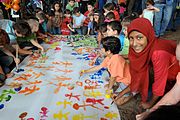IND/Education and Criminal Justice/Health/Otitis Media;
Education and Criminal Justice
Low educational achievement of Indigenous Australians has been implicated in the over-representation of Aboriginal people in custody and juvenile detention and is considered not only a factor in the likelihood of Aboriginal people offending, but also a factor in the likelihood of their re-offending (RCIADIC, 1991).
| “ | It is well-known that arrest and incarceration rates for Indigenous people are many times those for European Australians... From this Committee’s viewpoint another statistic is just as serious and revealing. The experience of arrest reduces the probability of attending school by 26 per cent and 18 per cent for males and females respectively. Living in households where others have been arrested reduces the probability of attending school by an additional 23 per cent and 20 per cent for males and females respectively… (Senate Inquiry into Indigenous Education, 2000, 53-55). | ” |
The Senate Inquiry into Indigenous Education (2000) also, however, highlighted the importance of education to reducing Indigenous contact with the criminal justice system.
The Royal Commission found that non-participation in school was likely to result in young Aboriginal and Torres Strait Islanders being introduced to the juvenile justice system at an early age. [Hence] improving the educational opportunities of Indigenous children and adults was seen as one way of trying to reduce the high incarceration rate of Indigenous people (Senate Inquiry into Indigenous Education, 2000, 53-55).
Education and Health
The evidence from around the world is very striking: with the addition of a single extra year of education in a population, the infant mortality rate drops by between seven and ten per cent. This has been found throughout the Third World. It has been found historically in a series of mortality data in relation to Western countries.One of the most substantiated findings in the literature of the social determinants of health that one of the major factors influencing child mortality is the level of education amongst their parents. There is also a great deal of research which shows that education has a positive effect on the health of people themselves and on the health of their children (Dr Bob Boughton cited in Senate Inquiry into Indigenous Education, 2000, 140).
Education and Otitis Media
Many reports detail the fact that health problems seriously affect the education of many Indigenous children through absenteeism or impaired ability to learn. One of the most common is the middle ear disease, Otitis media, commonly known as ‘glue-ear’. This disease is commonly found in poverty-stricken third world countries and begins with an infection in the middle ear causing the build-up of thick fluid. This build-up causes temporary and fluctuating deafness and can result in the eardrum bursting, releasing the fluid. The constant inflammation and perforation of the eardrum can cause permanent damage and as a consequence, some children may be profoundly deaf by the time they reach school age. The Senate Inquiry into Indigenous Education (2000) found that on any given day and average of half to two-thirds of Indigenous children suffered otitis media related hearing loss in one or both ears. The Northern Territory Department of Education’s review of Indigenous education (1999) found that over 90% of Aboriginal children in Year 4 at one NT bush school had no eardrums due to the damaging effects of chronic Otitis media.
The importance of hearing difficulties in relation to learning ability can be best understood when one considers the reality that school based learning depends upon a child’s ability to listen. In addition to the primary difficulties caused by hearing loss, if a child’s ability to learn is further affected by their inability to hear correctly, they are hugely disadvantaged in learning to read. People who have not mastered reading skills in the early years of schooling will find all subsequent school-based learning a struggle. Hence, learning disabilities are compounded. For Indigenous children who speak English as a second, third or fourth language, hearing difficulties can magnify the complexities of learning to master a new language at school.
